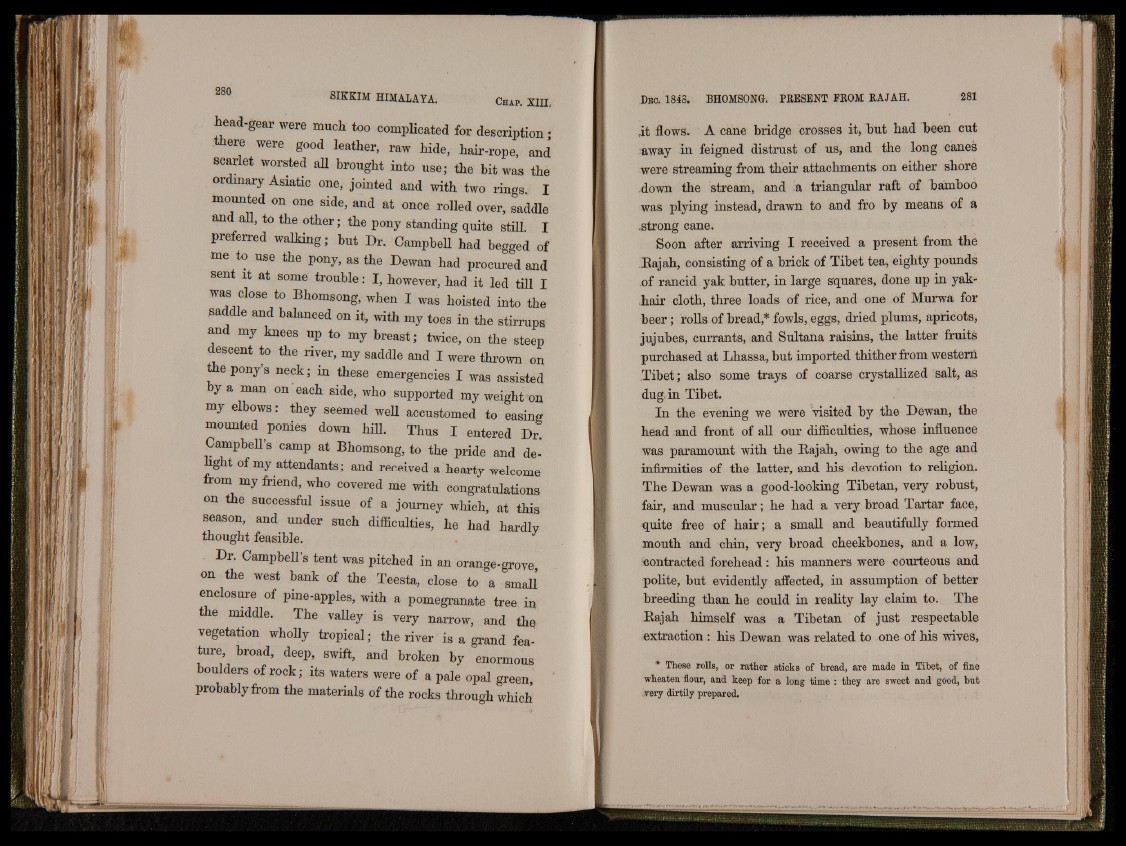
head-gear were much too complicated for description;
there were good leather, raw hide, hair-rope, and
scarlet worsted all brought into use; the bit was the
ordinary Asiatic one, jointed and with two rings. I
mounted on one side, and at once rolled over, saddle
and all, to the other; the pony standing quite still. I
preferred walking; but Dr. Campbell had begged of
me to use the pony, as the Dewan had procured and
sent it at some trouble: I, however, had it led till I
was dose to Bhomsong, when I was hoisted into the
saddle and balanced on it, with my toes in the stirrups
and my knees up to my breast; twice, on the steep
descent to the river, my saddle and I were thrown on
the pony’s neck; in these emergencies I was assisted
y a man on each side, who supported my weight on
my elbows: they seemed well accustomed to easing
mounted ponies down hill. Thus I entered Dr.
Campbell’s camp at Bhomsong, to the pride and de-
„ ght of my attendants; and received a hearty welcome
from my friend, who covered me with congratulations
on e successful issue of a journey which, at this
season, and under such difficulties, he had hardlv
thought feasible.
Dr. Campbell’s tent was pitched in an orange-grove
on the west bank of the Teesta, close to a small
enclosure of pine-apples, with a pomegranate tree in
the middle. The valley is very narrow, and the
vegetation wholly tropical; the river is a grand feature,
broad, deep, swift, and broken by enormous
boulders of rock; its waters were of a pale opal green
probably from the materials of the rocks through which
,it flows. A cane bridge crosses it, but had been cut
away in feigned distrust of us, and the long canes
were streaming from their attachments on either shore
down the stream, and a triangular raft of bamboo
was plying instead, drawn to and fro by means of a
.strong cane.
Soon after arriving I received a present from the
Bajah, consisting of a brick of Tibet tea, eighty pounds
of rancid yak butter, in large squares, done up in yak**
hair cloth, three loads of rice, and one of Murwa for
beer; rolls of bread,* fowls, eggs, dried plums, apricots,
jujubes, currants, and Sultana raisins, the latter fruits
purchased at Lhassa, but imported thither from western
Tibet; also some trays of coarse crystallized salt, as
dug in Tibet.
In the evening we were visited by the Dewan, the
head and front of all our difficulties, whose influence
was paramount with the Bajah, owing to the age and
infirmities of the latter, and his devotion to religion.
The Dewan was a good-looking Tibetan, very robust,
fair, and muscular; he had a very broad Tartar face,
quite free of hair; a small and beautifully formed
mouth and chin, very broad cheekbones, and a low,
'contracted forehead: his manners were courteous and
polite, but evidently affected, in assumption of better
breeding than he could in reality lay claim to. The
Bajah himself was a Tibetan of just respectable
extraction: his Dewan was related to one of his wives,
* These rolls, or rather stacks of bread, are made in Tibet, of fine
wheaten flour, and keep for a long time : they are sweet and good, but
very dirtily prepared.